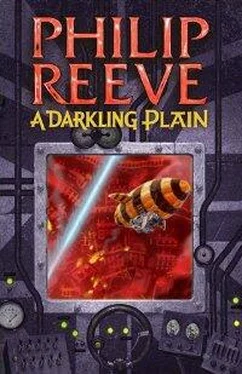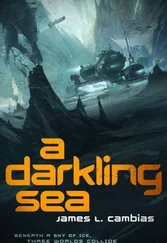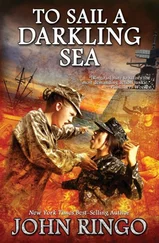“This is how we get ’eavy cargoes out of the Archy and into London,” whispered Wren’s guard, Angie. “The Mossies’ spy birds can’t see us if we keep inside this old duct. We call it ‘taking the tube.’ ”
“The Hollow-Way Road,” said Wren, reading the sign again. “Oh, very funny…”
“Well, yer gotter ’ave a laugh, ain’t yer?”
They followed the Holloway Road for what felt like a mile or more, sometimes by lantern light, sometimes through patches of sunshine that spilled in through rents in the skin of the old duct. The way twisted and turned, and the floor sloped steeply sometimes where the duct dipped down into a hollow of the earth or lay draped across another section of wreckage. Underfoot the dust between the rails was stamped with the prints of passing boots.
At the end of the duct they passed more makeshift cargo carts and another set of buffers, and emerged into daylight again to find a pathway of metal duckboards leading between two steep hills of scrap. Beyond the hills stretched an open space that had been cleared of wreckage. Kitchen gardens had been laid out in raised beds full of peaty soil, and people broke off from picking cabbages and digging potatoes to stand staring as the prisoners were led by.
Tom stared back. There were not just people inside London; there were lots of people. He looked at their faces, but there was no one he recognized. It didn’t matter; they were Londoners, that was what was important. Many of them bore the marks of old injuries; he saw missing limbs and fingers, a man with a burned face, a blinded woman being guided along by her children, who were telling her excitedly about Tom, Wren, and Wolf. Scars everywhere. Hester would have felt at home here, he thought, and he wished that the wind had blown the Jenny Haniver the other way on that morning after MEDUSA, and carried him and Hester into London instead of away from it. How different things might have been if they had lived in the debris fields…
At the far side of the garden area a massive section of deck plate lay propped upon the ruins, forming a low-ceilinged cave. Garamond led his party in through the long, letterbox-shaped opening. The iron roof was so low that everyone had to stoop, but in the shadows dozens of small huts and houses had been erected, built from scraps of metal and wood. Crowds were waiting there, alerted by the children who were running excitedly ahead of the procession. “Where’s Miss Potts?” shouted Garamond over all the noise, and a bald-headed gentleman in a grubby white rubber coat (An Engineer!, thought Tom uneasily) replied, “She’s at the town hall, Garamond.”
The procession went marching on, deeper and deeper into the metal-roofed cavern until the deck plate overhead was so low, they had to bend almost double to save themselves from cracking their heads on the old bolts and fittings that poked down from it. “This is why it’s called Crouch End,” said Wren’s friendly guard. “It ain’t a very convenient place to live, but in the old days, with sprites and Mossies and Quirke-knows-what-else to hide away from, a roof over our ’eads was very welcome…”
“Angie Peabody,” barked Mr. Garamond, “I thought I told you to shut your cakeholel”
Wedged in under the lowest corner of the deck plate was a building fashioned out of an old Gut Supervisor’s office and bits of many other things, all nailed and bolted together in a workmanlike way and painted a cheerful shade of red. london emergency committee someone had written above the door, in careful capitals. Garamond left his charges outside while he went in and had a muffled conversation with someone. Then he came out again and pushed the door wide open. “Step along now, prisoners,” he said. “And show a bit of respect. You are entering the presence of the lord mayor of London!”
The floor inside the building had been dug out so that there was no need to stoop. Tom went first, with Will Hallsworth at his side, warning him to watch out for the steps. He tripped down them anyway, and landed in a big, slope-ceilinged room where a map of the debris fields covered one wall, marked all over with tickets and flags and mysterious red pins. Around a battered old tin table in the center of the room a dozen people were gathered, looking as if they had been in the middle of a meeting when they were interrupted by the arrival of Mr. Garamond and his prisoners. One of them was Clytie Potts. She stood up when she recognized Tom. “Oh, Quirke!” she said.
Beside her, another of the committee was already rising to greet the new arrivals, and his shabby red robe and chain of office marked him clearly as the lord mayor. Tom felt relieved. For a moment he had feared that he was about to come face-to-face with Magnus Crome, the sinister Engineer who had ruled London in his childhood. But this ancient, portly gentleman with tufts of white hair sprouting like steam around his ears was not Crome. And after the relief came astonishment, for Tom found that he knew that round, red face, and meeting it here was even more of a shock than his first encounter with Clytie Potts. “Chudleigh Pomeroy!” he cried.
“I— Great Quirke and Clio!” the old man said, his white eyebrows leaping in surprise. “By the Sacred Black Flannel of Sooty Pete! If it isn’t young Apprentice Thing! Young Whatchamacallit! Young, um…”
“Natsworthy,” said Tom. He had always been a little afraid of the Deputy Head Historian, but meeting him here, realizing that he had survived down all these years and against all these odds, made him weep with happiness. He wiped the tears away and said in a wobbly voice, “Tom Natsworthy, Mr. Pomeroy; Apprentice Third Class. I’ve come home.”
Chapter 20
Children of MEDUSA
Chudleigh Pomeroy called for refreshments to be brought from the settlement’s communal kitchen, and fussed at his colleagues to clear away their piles of paper and make room at the table for the visitors. Tom, who was starting to recover from his shock, turned to look at the other committee members. Two of them were Engineers—a small, brown-skinned man and a rather severe-looking old lady, as bald as two pebbles, and wearing tattered white rubber coats. The rest were just ordinary Londoners; people of all shapes and sizes and several different colors, including a wiry, leathery little man who waved at Angie, prompting her to wave back and say, “ ’Ullo, Dad!” He looked to Tom as if he’d been a Gut laborer before MEDUSA went off; certainly not the type of person you would have found in London’s council chamber in the old days.
At last three seats were cleared for the newcomers. Chudleigh Pomeroy beamed at them as they sat down. “Pleased to meet you, Miss Natsworthy” he said, reaching across the table to shake Wren’s hand when Tom introduced her. “And Herr Kobold. We’ve heard a lot about the bravery of your city and its allies. Miss Potts here keeps us up-to-date with the war news. Welcome to London.”
“Thank you, sir,” said Wolf, bowing neatly his hand moving to where his sword hilt would have been if Mr. Garamond had not taken his sword away from him. “This is not my first visit. The last time I was here, I found myself ejected before I could actually meet any of your people…” He smiled slyly at the puzzled faces around him and quickly explained the story of his first visit to the debris fields.
“Great Quirke!” muttered Garamond. “I remember him now…”
“You’re not the first lost soldier to seek shelter here,” said Pomeroy. “The lost and wounded of both sides blunder into the fringes of the wreck sometimes. We couldn’t risk any of them going off and blurting out our secrets to the outside world, but we didn’t want to murder them or anything, so we came up with the notion of simply scaring them away. A few mysterious moans are usually enough to set the bravest of ’em running, but now and then we come across one who’s more inquisitive. When we do, we knock ’em out with chloroform before they can see anything and dump them outside the wreckage. Most of them get the message. You’re the first to return.”
Читать дальше












